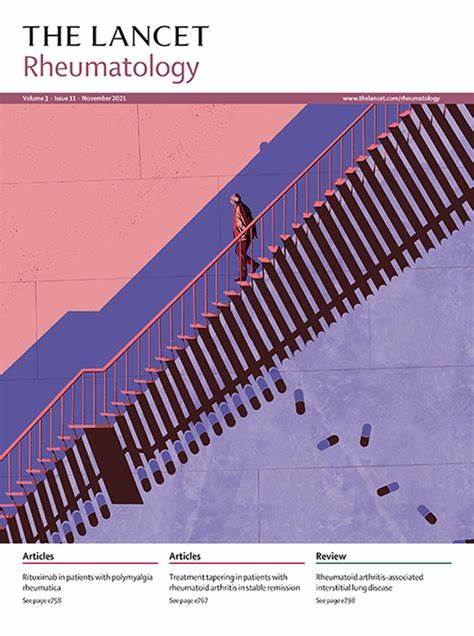Faecal microbiota transplantation in patients with systemic sclerosis and lower gastrointestinal tract symptoms in Norway (ReSScue): a phase 2, randomised, double-blind, placebo-controlled trial
IF 15
1区 医学
Q1 RHEUMATOLOGY
引用次数: 0
Abstract
Background
Gastrointestinal tract involvement is highly prevalent in systemic sclerosis, with few treatment options. We assessed the efficacy and safety of faecal microbiota transplantation using standardised anaerobic cultivated human intestinal microbiome (ACHIM) as a novel treatment option for patients with systemic sclerosis and symptomatic lower gastrointestinal tract involvement.
Methods
In this phase 2, randomised, double-blind, placebo-controlled trial done at four university hospitals in Norway, we enrolled adults aged 18–85 years with systemic sclerosis and moderate-to-severe lower gastrointestinal tract symptoms (bloating or diarrhoea). Participants were randomly assigned 1:1 to intestinal infusions of placebo or ACHIM at weeks 0 and 2, stratified by worst symptom (bloating or diarrhoea). The primary endpoint was change in worst lower gastrointestinal tract symptom (bloating or diarrhoea) from week 0 to week 12, measured using the University of California Los Angeles Scleroderma Clinical Trial Consortium Gastrointestinal Tract 2.0 scoring system in the intention-to-treat population. Safety was assessed at weeks 0, 2, 4, 6, and 12 in all participants who received at least one infusion. A person with lived experience of systemic sclerosis was involved in the study planning and conduct. This trial was registered at ClinicalTrials.gov, NCT04300426.
Findings
Between Sept 24, 2020, and Jan 14, 2022, 67 participants were enrolled and randomly allocated to placebo (n=34) or ACHIM (n=33). Mean age was 58·91 years (SD 11·59). 62 (93%) of 67 participants were women, five (7%) were men, and 50 (75%) were anti-centromere antibody positive. Change in worst lower gastrointestinal tract symptom from week 0 to week 12 did not differ between participants who received ACHIM (–0·13, 95% CI –0·37 to 0·11) and participants who received placebo (–0·33, –0·57 to –0·09; average marginal effect 0·20, 95% CI –0·12 to 0·52; p=0·22). Adverse events, mostly mild and short-lived gastrointestinal tract symptoms, were reported by 16 (48%) of 33 participants in the ACHIM group and 19 (56%) of 34 in the placebo group. During gastroscopy, one participant had a duodenal perforation.
Interpretation
Faecal microbiota transplantation with ACHIM was well tolerated in participants with systemic sclerosis but did not result in an improvement in lower gastrointestinal tract symptoms.
Funding
KLINBEFORSK.
Translation
For the Norwegian translation of the abstract see Supplementary Materials section.
挪威(rescue)系统性硬化症和下胃肠道症状患者的粪便微生物群移植:一项随机、双盲、安慰剂对照的2期试验。
背景:胃肠道受累在系统性硬化症中非常普遍,治疗选择很少。我们评估了粪便微生物群移植的有效性和安全性,采用标准化厌氧培养人肠道微生物组(ACHIM)作为系统性硬化症和症状性下胃肠道受累患者的一种新的治疗选择。方法:在挪威四所大学医院进行的这项随机、双盲、安慰剂对照的2期试验中,我们招募了年龄在18-85岁之间、患有系统性硬化症和中重度下胃肠道症状(腹胀或腹泻)的成年人。在第0周和第2周,参与者按最严重症状(腹胀或腹泻)分层,随机按1:1分配到安慰剂或ACHIM肠道输注组。主要终点是从第0周到第12周最严重的下胃肠道症状(腹胀或腹泻)的变化,使用加州大学洛杉矶分校硬皮病临床试验协会胃肠道2.0评分系统在意向治疗人群中进行测量。在所有接受至少一次输注的参与者中,安全性在第0、2、4、6和12周进行评估。一位有系统性硬化症生活经验的人参与了研究的计划和实施。该试验已在ClinicalTrials.gov注册,编号NCT04300426。研究结果:在2020年9月24日至2022年1月14日期间,67名参与者入组,随机分配到安慰剂组(n=34)或ACHIM组(n=33)。平均年龄58.91岁(SD 11.59)。67名参与者中62名(93%)为女性,5名(7%)为男性,50名(75%)为抗着丝粒抗体阳性。从第0周到第12周,接受ACHIM治疗的参与者(- 0.13,95% CI - 0.37至0.11)和接受安慰剂治疗的参与者(- 0.33,- 0.57至- 0.09;平均边际效应为0.20,95% CI为- 0.12 ~ 0.52;p = 0·22)。ACHIM组33名参与者中有16名(48%)报告了不良事件,安慰剂组34名参与者中有19名(56%)报告了不良事件,主要是轻微和短暂的胃肠道症状。在胃镜检查期间,一名参与者有十二指肠穿孔。解释:ACHIM粪便菌群移植在系统性硬化症患者中耐受性良好,但并未导致下胃肠道症状的改善。资金:KLINBEFORSK。翻译:关于摘要的挪威语翻译,见补充材料部分。
本文章由计算机程序翻译,如有差异,请以英文原文为准。
求助全文
约1分钟内获得全文
求助全文
来源期刊

Lancet Rheumatology
RHEUMATOLOGY-
CiteScore
34.70
自引率
3.10%
发文量
279
期刊介绍:
The Lancet Rheumatology, an independent journal, is dedicated to publishing content relevant to rheumatology specialists worldwide. It focuses on studies that advance clinical practice, challenge existing norms, and advocate for changes in health policy. The journal covers clinical research, particularly clinical trials, expert reviews, and thought-provoking commentary on the diagnosis, classification, management, and prevention of rheumatic diseases, including arthritis, musculoskeletal disorders, connective tissue diseases, and immune system disorders. Additionally, it publishes high-quality translational studies supported by robust clinical data, prioritizing those that identify potential new therapeutic targets, advance precision medicine efforts, or directly contribute to future clinical trials.
With its strong clinical orientation, The Lancet Rheumatology serves as an independent voice for the rheumatology community, advocating strongly for the enhancement of patients' lives affected by rheumatic diseases worldwide.
 求助内容:
求助内容: 应助结果提醒方式:
应助结果提醒方式:


